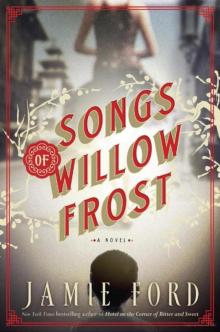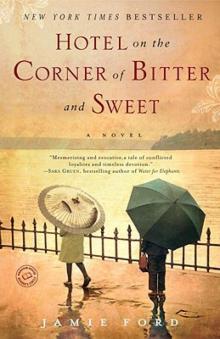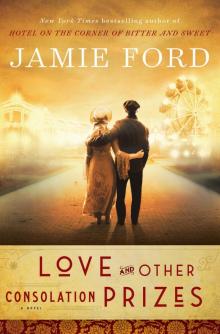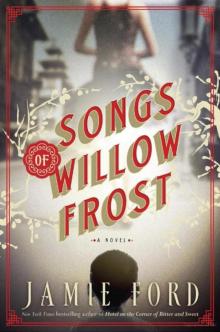- Home
- Jamie Ford
Hotel on the Corner of Bitter and Sweet Page 2
Hotel on the Corner of Bitter and Sweet Read online
Page 2
Maybe that's what this is for, Henry thought, looking at the ridiculous button that read "I am Chinese." Thanks, Dad, why not just put a sign on my back that says "Kick me" while you're at it?
Henry walked faster, finally rounding the corner and heading north. At the halfway point of his walk to school, he always stopped at the arched iron gateway at South King Street, where he gave his lunch to Sheldon, a sax player twice Henry's age who worked the street corner, playing for the tourists' pleasure and pocket change.
Despite the booming activity at Boeing Field, prosperity didn't seem to reach locals like Sheldon. He was a polished jazz player, whose poverty had less to do with his musical ability and more to do with his color. Henry had liked him immediately. Not because they both were outcasts, although if he really thought about it, that might have had a ring of truth to it--no, he liked him because of his music. Henry didn't know what jazz was, he knew only that it was something his parents didn't listen to, and that made him like it even more.
"Nice button, young man," said Sheldon, as he was setting out his case for his morning performances. "That's a darn good idea, what with Pearl Harbor and all."
Henry looked down at the button on his shirt; he had already forgotten it. "My father's idea," he mumbled. His father hated the Japanese. Not because they sank the USS
Arizona--he hated them because they'd been bombing Chongqing, nonstop, for the last four years. Henry's father had never even been there, but he knew that the provisional capital of Chiang Kai-shek had already become the most-bombed city in history.
Sheldon nodded approvingly and tapped the metal tin hanging from Henry's book bag. "What's for lunch today?"
Henry handed over his lunch box. "Same as always." An egg-olive sandwich, carrot straws, and an apple pear. At least his mother was kind enough to pack him an American lunch.
Sheldon smiled, showing a large gold-capped tooth. "Thank you, sir, you have a fine day now."
Ever since Henry's second day at Rainier Elementary, he'd been giving his lunch to Sheldon. It was safer that way. Henry's father had been visibly excited when his son was accepted at the all-white school at the far end of Yesler Way. It was a proud moment for Henry's parents. They wouldn't stop talking about it to friends on the street, in the market, and at the Bing Kung Benevolent Association, where they went to play bingo and mah-jongg on Saturdays. "They take him scholarshipping," was all he ever heard his parents say in English.
But what Henry felt was far from pride. His emotions had gone sprinting past fear to that point of simply struggling for survival. Which was why, after getting beat up by Chaz Preston for his lunch on the first day of school, he'd learned to give it to Sheldon.
Plus, he made a tidy profit on the transaction, fishing a nickel from the bottom of Sheldon's case on the way home each day. Henry bought his mother a starfire lily, her favorite flower, once a week with his newfound lunch money-- feeling a little guilty for not eating what she lovingly prepared, but always making up for it with the flower.
"How you buy flower?" she'd ask in Chinese.
"Everythingwasonsaletodayspecialoffer." He'd make up some excuse in English, trying to explain it--and the extra change he always seemed to bring home from his errands to the market. Saying it fast, fairly sure she wouldn't catch on. Her look of confusion would coalesce into satisfied acceptance as she'd nod and put the change in her purse. She understood little English, but Henry could see she appreciated his apparent bargaining skills.
If only his problems at school were solved so easily.
For
Henry,
scholarshipping had very little to do with academics and everything to do with work. Luckily, he learned to work fast. He had to. Especially on his assignments right before lunch--since he was always dismissed ten minutes early. Just long enough to find his way to the cafeteria, where he'd don a starched white apron that covered his knees and serve lunch to the other kids.
Over the past few months, he'd learned to shut his mouth and ignore the heckling-
-especially from bullies like Will Whitworth, Carl Parks, and Chaz Preston.
And Mrs. Beatty, the lunch lady, wasn't much help either. A gassy, hairnet-wearing definition of one of Henry's favorite American words: broad. She cooked by hand, literally, measuring everything in her dirty, wrinkled mitts. Her thick forearms were evidence that she'd never used an electric mixer. But, like a kenneled dog that refuses to do its business in the same place it sleeps, she never ate her own handiwork. Instead, she always brought her lunch. As soon as Henry laced up his apron, she'd doff her hairnet and vanish with her lunch pail and a pack of Lucky Strikes.
Scholarshipping in the cafeteria meant Henry never made it out to recess. After the last kid had finished, he'd eat some canned peaches in the storage room, alone, surrounded by towering stockpiles of tomato sauce and fruit cocktail.
Flag Duty
(1942)
Henry wasn't sure which was more frustrating, the nonstop taunting in the school cafeteria or the awkward silence in the little Canton Alley apartment he shared with his parents. Still, when morning came, he tried to make the best of the language barrier at home as he went about his normal routine.
"Jou san." His parents greeted him with "Good morning" in Cantonese.
Henry smiled and replied in his best English, "I'm going to open an umbrella in my pants." His father nodded a stern approval, as if Henry had quoted some profound Western philosophy. Perfect, Henry thought, this is what you get when you send your son scholarshipping. Stifling a laugh, he ate his breakfast, a small pyramid of sticky rice, flavored with pork, and cloud ear mushrooms. His mother looked on, seemingly knowing what he was up to, even if she didn't understand the words.
When Henry rounded the block that morning, heading to the main steps of Rainier Elementary, he noticed that two familiar faces from his class had been assigned to flag duty. It was an assignment envied by all the sixth-grade boys, and even a few of the girls, who weren't allowed, for reasons unknown to Henry.
Before the first bell, the pair of boys would take the flag from its triangle-shaped rack in the office and head to the pole in front of the school. There they'd carefully unfold it, making sure no part of it touched the ground, since a flag desecrated in such a way was immediately burned. That was the story anyway; neither Henry nor any other kid in recent memory had ever known of such a thing actually occurring. But the threat was legendary. He pictured Vice Principal Silverwood, a blocky harrumphing old bear of a man, burning the flag in the parking lot while shocked faculty looked on--then sending the bill home with the clumsy boy responsible. His parents surely would be shamed into moving to the suburbs and changing their names so no one would ever find them.
Unfortunately Chaz Preston and Denny Brown, who were on flag duty, were not likely to move away any time soon, regardless of what they did. Both were from prominent local families. Denny's father was a lawyer or a judge or something, and Chaz's family owned several apartment buildings downtown. Denny was no friend of Henry's, but Chaz was the real menace. Henry always thought Chaz would end up as his family's bill collector. He liked to lean on people. He was so mean the other bullies feared him.
"Hey,
Tojo, you forgot to salute the flag," Chaz shouted.
Henry kept walking, heading for the steps, pretending he hadn't heard. Why his father thought attending this school was such a great idea, Henry would never know. Out of the corner of his eye, he watched Chaz tie the flag off and amble toward him. Henry walked faster, heading for the safety of the school, but Chaz cut him off
"Oh, that's right, you Japs don't salute American flags, do you?"
Henry wasn't sure which was worse, being picked on for being Chinese, or being accused of being a Jap. Though Tojo, the prime minister of Japan, was known as "the Razor" because of his sharp legalistic mind, Henry only wished he were sharp enough to stay home from school when his classmates were giving speeches about the Yellow Peril.
Hi
s teacher, Mrs. Walker, who rarely spoke to Henry, didn't stop the inappropriate and off-color remarks. And she never once called him to the blackboard to figure a math problem, thinking he didn't understand English--though his improving grades must have clued her in, a little bit at least.
"He won't fight you, he's a yellow coward. Besides, the second bell's gonna ring any minute." Denny sneered at Henry and headed inside.
Chaz didn't move.
Henry looked up at the bully blocking his way but didn't say a thing. He'd learned to keep his mouth shut. Most of his classmates ignored him, but the few who made a point of pushing him around generally got bored when he wouldn't respond. Then he remembered the button his father had made him wear and pointed it out to Chaz.
" 'I am Chinese,' " Chaz read out loud. "It don't make no difference to me, shrimp, you still don't celebrate Christmas, do you?"
The second bell rang.
"Ho, ho, ho," Henry replied. So much for keeping my mouth shut, he thought. We do celebrate Christmas, along with Cheun Jit, the lunar new year. But no, Pearl Harbor Day is not a festive occasion.
"Lucky for you I can't be late or I'll lose flag duty," Chaz said before he faked a lunge at Henry, who didn't flinch. Then Henry watched the bully back up and head into the building. He exhaled, finally, and found his way down the empty hallway to Mrs.
Walker's classroom, where she reprimanded him for being tardy--and gave him an hour of detention. Henry accepted his punishment without a word. Not even a look.
Keiko
(1942)
When Henry arrived in the school kitchen that afternoon, there was a new face, though because it was turned toward a stack of beet-stained serving trays, he couldn't see much of it. But it was clearly a girl, probably in his grade, about his height; she was hidden behind long bangs and the black strands of hair that framed her face. She sprayed the trays with hot, steaming water and put them in the dish rack, one by one. As she slowly turned toward Henry, he noticed her slender cheekbones, her perfect skin, smooth and lacking in the freckles that mottled the faces of the other girls at the school.
But most of all, he noticed her soft chestnut-brown eyes. For a brief moment Henry swore he smelled something, like jasmine, sweet and mysterious, lost in the greasy odors of the kitchen.
"Henry, this is Keiko--she just transferred to Rainier, but she's from your part of town." Mrs. Beatty, the lunch lady, seemed to regard this new girl as another piece of kitchen machinery, tossing her an apron, shoving her next to Henry behind the serving counter. "Heck, I bet you two are related, aren't you?" How many times had he heard that one?
Mrs. Beatty wasted no time and fished out a Zippo lighter, lit a cigarette one-handed, and wandered off with her lunch. "Call me when you're all done," she said.
Like most boys his age, Henry liked girls a lot more than he could bring himself to admit--or actually show to anyone, especially around other boys, who all tried to act cool, as if girls were some strange new species. So, while he did what came naturally, trying his best to show indifference, he was secretly elated to have a friendly face in the kitchen. "I'm Henry Lee. From South King Street."
The peculiar girl whispered, "I'm Keiko."
Henry wondered why he hadn't seen her around the neighborhood before; maybe her family had just come over. "What kind of name is Kay-Ko?"
There was a pause. Then the lunch bell rang. Doors were slamming down the hall.
She took her long black hair in equal handfuls and tied it with a ribbon. "Keiko Okabe," she said, tying on her apron and waiting for a reaction.
Henry was dumbfounded. She was Japanese. With her hair pulled back, he could see it clearly. And she looked embarrassed. What was she doing here?
The sum total of Henry's Japanese friends happened to be a number that rhymed with hero. His father wouldn't allow it. He was a Chinese nationalist and had been quite a firebrand in his day, according to Henry's mother. In his early teens, his father had played host to the famed revolutionary Dr. Sun Yat-sen when he visited Seattle to raise money to help the fledgling Kuomintang army fight the Manchus. First through war bonds, then he'd helped them open up an actual office. Imagine that, an office for the Chinese army,
right down the street. It was there that Henry's father kept busy raising thousands of dollars to fight the Japanese back home. His home, not mine, Henry thought. The attack on Pearl Harbor had been terrible and unexpected, sure, but it paled when compared with the bombings of Shanghai or the sacking of Nanjing-- according to his father anyway.
Henry, on the other hand, couldn't even find Nanjing on a map.
But he still didn't have a single Japanese friend, even though there were twice as many Japanese as Chinese kids his age, and they lived just a few streets over. Henry caught himself staring at Keiko, whose nervous eyes seemed to recognize his reaction.
"I'm American," she offered in defense.
He didn't know what to say, so he focused on the hordes of hungry kids who were coming. "We'd better get busy."
They took the lids off their steamer trays, recoiling at the smell, looking at each other in disgust. Inside was a brown, spaghetti-like mess. Keiko looked like she wanted to throw up. Henry, who was used to the putrid stench, didn't even flinch. He simply showed her how to dish it up with an old ice-cream scoop as freckled boys in crew cuts, even the younger ones, said, "Look, the Chink brought his girlfriend" and "More chop suey please!"
At the most they taunted, at the least they sneered and glared suspiciously. Henry kept silent, angry and embarrassed as always, but pretending he didn't understand. A lie he wished he believed--if only in self-defense. Keiko followed suit. For thirty minutes they stood side by side, occasionally looking at each other, smirking as they served up extra-large helpings of Mrs. Beatty's rat-scrabble slop to the boys who teased them the most, or the red-haired girl who pulled at the corners of her eyes and made a hideous bucktoothed face.
"Look, they don't even speak English!" she squealed.
He and Keiko smiled at each other until the last child was served and all the trays and pans were washed and put away. Then they ate their lunch, together, splitting a can of pears in the storage room.
Henry thought the pears tasted especially good that day.
The Walk Home
(1942)
A week after Keiko arrived, Henry had settled into a new routine. They'd have lunch together, then meet by the janitor's closet after school for the second part of their work duties. Side by side they'd clean the chalkboards, empty wastebaskets, and pound erasers behind the school on an old stump. It wasn't bad. Having Keiko around cut the work he'd previously been doing in half, and he enjoyed the company--even if she was Japanese. Besides, all the work after school gave the other kids plenty of time to get on their bikes or their buses and be on their way long before he stepped out onto the school yard.
That was how it was supposed to work.
But today as he held the door for Keiko when they left the building, Chaz was standing at the bottom of the steps. He must have missed his bus, Henry thought. Or maybe he'd sensed a murmur of happiness since Keiko had arrived. Just a glance, or a smile between them. Even if he is here to show me up, Henry thought, that's fine, as long as he doesn't hurt her.
He and Keiko walked down the steps and past Chaz, Henry on the inside, putting himself between her and the bully. As they descended, Henry became all too aware that his nemesis was a whole foot taller than either one of them.
"Where do you think you're going?"
Chaz should have been in a higher grade, but he'd been held back-- twice. Henry had long suspected he'd failed on purpose so he could continue to lord over his sixth-grade kingdom. Why give that up to be an eighth-grade nobody?
"I said, Where do you think you're going--Jap lover?"
Keiko was about to speak when Henry shot her a look, put his arm around her, and kept her walking.
Chaz stepped in front of them. "I know you understand every word I'm saying, I've s
een you two talking after class."
"So?" Henry said.
"So." Chaz grabbed him by his collar and jerked him up to his chest, so close Henry could smell his lunch--onions and powdered milk, still ripe on his breath. "How about I make it so you can't talk anymore? How would you like that?"
"Stop it!" Keiko shouted. "Let him go!"
"Leave the kid alone, Charlie," Mrs. Beatty interrupted, walking down the steps, lighting a cigarette. Judging by her nonchalance, Henry figured she was used to Chaz's lapses in behavior.
"My name is Chaz."
"Well, Chaz honey, if you hurt that kid, you're going to be taking his place in the kitchen, you understand me?" She said it in a way that almost sounded like she cared.
Almost. The hard look on her face put just enough doubt in Chaz's mind. He let go, shoving Henry to the ground-- but not before ripping the button that read "I am Chinese"

 Songs of Willow Frost
Songs of Willow Frost Hotel on the Corner of Bitter and Sweet
Hotel on the Corner of Bitter and Sweet Love and Other Consolation Prizes
Love and Other Consolation Prizes Songs of Willow Frost: A Novel
Songs of Willow Frost: A Novel